- Home
- Richard Matheson
Duel Page 11
Duel Read online
Page 11
They were pictures of food.
A head of cabbage, a roast turkey. In some of them, partially unclad women held desiccated lettuce leaves, lean tomatoes, dried up oranges; held them out in their hands in profane offering.
“God, I want to go back,” he muttered.
He was halfway to the door when he realized that he had no idea where his chamber was. He stood weaving on the threadbare rug, listening to Castlemould’s snores ring out.
Then he went back and squatted dizzily by the side of the desk. He kept his eyes on the open-mouthed Commissioner as he slid out the desk drawers.
In the bottom drawer he found what he wanted; a strange gun-like tube. He took hold of it.
“Get up,” he said angrily, rapping the old man on the head.
“Aaahh!” cried Castlemould, starting up. His midriff collided with the desk edge. He fell back in the chair, the wind knocked out of him. “Get up,” Wade said.
A confused Castlemould stared up. He tried to smile and a crumb fell from his lips.
“Now look here, young man!”
“Shut up. You’re taking me back to my chamber.”
“Now, wait a …”
“Now!”
“Don’t fool with that thing,” Castlemould warned. “It’s dangerous.”
“I hope it’s very dangerous,” Wade said. “Now get up and take me to your car.”
Castlemould scurried to his feet. “Young man, this is …”
“Oh, be quiet, you senile goat. Take me to your car and hope I don’t push this button.”
“God, don’t do that!”
The Commissioner suddenly stopped halfway to the door. He grimaced and bent over as his stomach began to protest against its violation.
“Oh! That food,” he muttered wretchedly.
“I hope you have the belly ache of the century,” said Wade, prodding him on. “You deserve it.”
The old man clutched at his paunch. “Ohhhh.” He groaned. “Don’t shove.”
They went into the hall. Castlemould spun against the closet door. He clawed at the wood. “I’m dying!” he announced.
Wade ordered, “Come on!”
Castlemould, heedless, pulled open the door and plunged into the closet depths. There, in the stuffy blackness, he was very sick.
Wade turned away in disgust.
At last the old man stumbled forth, face white and drawn. He shut the door and leaned back against it. “Oh,” he said weakly.
“You deserved that,” Wade said. “Richly.”
“Don’t talk,” begged the old man. “I may die yet.”
“Let’s go,” Wade said.
They were in the car. A recovered Commissioner was at the wheel. Wade sat across the wide front seat from him holding the weapon level at Castlemould’s chest.
“I apologize for …” started the Commissioner.
“Drive.”
“Well, I don’t like to feel inhospitable.”
“Shut up.”
The old man’s face tightened. “Young man,” he said tentatively, “how would you like to make some money?”
Wade knew what was coming. “How?” he asked anyway.
“Very simple.”
“Bring you food,” Wade finished.
Castlemould’s face twitched. “Well,” he whined, “what’s so bad about that?”
“You have gall to ask me that,” Wade said.
“Now look, young man. Son.”
“Oh, God, shut up,” Wade said, twisting his shoulders in disgust. “Think of your hall closet and shut up.”
“Now son,” insisted the Commissioner, “that was only because I’m not used to it. But now I …” His face became suddenly clever and evil. “I have a taste for it.”
“Then lose your taste,” Wade said, never taking his eyes off the old man.
The Commissioner looked desperate. His scrawny fingers tightened on the wheel. His left foot drummed resolutely on the floorboards. “You won’t change your mind?” he said, threateningly.
“You’re lucky I don’t shoot you.”
Castlemould said no more. He watched the road with slitted calculating eyes.
The car hissed up beside the chamber and stopped. “Tell the officers you want to examine the chamber,” Wade told him.
“If I don’t?”
“Then whatever comes out of this tube, you’ll get right in the stomach.”
Castlemould forced a brisk smile to his lips and the officers came up.
“What’s the meaning—ohhh Commissioner!” the officer said, shifting noticeably from truculence to reverence. “What can we do for you?” He doffed his cap with a face-halving smile.
“Want to look over that … thing,” said Castlemould. “Want to check something.”
“Yes sir, sir,” said the officer.
“I’m putting the tube in my pocket,” Wade said quietly.
The Commissioner said nothing as he opened the door. The two of them approached the chamber. Then Castlemould said loudly, “I’ll go in first. Might be dangerous.”
The officers murmured appreciatively of his courage. Wade’s mouth tightened. He contented himself by thinking how hard he was going to boot the old man right out into the street.
The Commissioner’s bones crackled energetically as he reached up for the two door rungs. He pulled himself up with a teeth-clenching grunt. Wade gave him a shove and enjoyed the sound of the old Commissioner flying against the steel bulkhead.
He reached up his free hand. But he couldn’t get in with just one hand. He had to reach up both. He grabbed the rungs and swung in quickly.
The moment Wade entered Castlemould plunged his hand into Wade’s pocket and jerked out the weapon.
“Aaah-haah!” His high pitched voice echoed shrilly inside the small shell.
Wade pressed against the bulkhead. He could see a little in the dimness. “What do you think you’re going to do now?” he asked.
The porcelain teeth flashed. “You’re taking me back,” Castlemould said. “I’m going with you.”
“There’s only room for one person in here.”
“Then it’ll be me.”
“You can’t operate it.”
“You tell me,” Castlemould ordered.
“Or what?”
“Or I’ll burn you up.”
Wade tensed himself. “And if I tell you?” he asked.
“You stay here till I come back.”
“I don’t believe you.”
“You have to, young man,” cackled the Commissioner. “Now tell me how it works.”
Wade reached for his pocket. “Watch it!” warned Castlemould.
“Do you want me to get out the instruction sheet or not?”
“Go on. But watch it. Instruction sheet, hah?”
“You wouldn’t understand a word of it.” Wade reached into his pocket.
“What’s that you got?” Castlemould asked. “That’s not paper.”
“A bar of chocolate,” Wade breathed the words. “A thick, sweet, creamy, rich bar of chocolate.”
“Gimme it!”
“Here. Take it.”
The Commissioner lunged. He fell off balance, the weapon pointed at the floor. As he pitched forward, Wade grabbed the old man by the collar and the seat of the pants. He hurled Commissioner Castlemould out through the doorway and the old man went sprawling into the street.
Shouts. The officers were horrified. Wade tossed out the chocolate bar.
“Obscene dog!” he roared, choking with laughter as the bar bounced off Castlemould’s ridged skull.
Then he jerked the door shut and turned the wheel until he was sealed. He flipped switches and strapped himself down, chuckling at the thought of the Commissioner trying to explain the bar of chocolate so he could keep it.
Next, the intersection was empty on that spot except for a few wisps of acrid smoke. There was only one sound in the dead stillness.
The contemplative wail of a hungry old man.
“Hey!” said his friend. “You made it!”
“Of course,” Wade said, feeling the pleasure of understatement.
“This calls for a celebration,” said his friend. “I’m taking you out tonight and buying you the biggest steak you ever saw—hey, what’s the matter?”
Professor Wade was blushing.
LOVER WHEN YOU’RE NEAR ME
THE SILVERY WELDED SHIP CAME RUSHING BACKWARDS through the veils of broken cloud, tobogganing down the atmosphere of Station Four. Fires of deceleration jetted red from the reactor ports, roaring their hurricane thrust against the clutch of gravity.
Air thickened; the glittering rocket speck slid easier, settling itself downward like a parachuting missile. Sunlight splashed its metal sides with light and the blue ocean waters billowed wide to swallow it. The ship dipped in a wide arc and backed down toward the reddish-green clad land.
Inside its tiny cabin, the two men lay strapped and waiting for the shock of contact. Their eyes were closed, their hands tight and blood-drained. Muscle blocks struggled against the drag.
The earth swept up and blocked its way; the ship settled hard on its rear braces, trembling. Then, in an instant, it stood motionless and silent, successfully navigated through a thousand billion miles of vacuumed night.
A quarter mile away were the warehouse, the village and the house.
Critical. That was the official record. It was supposed to be secret but David Lindell knew it; all the Wentner men had known it. Station Four The Birds and the Three-Moon Psycho Ward. That was scuttlebutt and to be taken with a fistful of salt. Lindell knew that too.
But it all meant something; the laughter, the ribbing, the silence from upstairs. They put a man on other stations for two years at a clip. Here on Four it was only for six months. That meant something. It adds up, they used to say in the briefing room on Earth. Wentner’s Interstellar Trading Company doesn’t break its heart for nothing. And Lindell believed it.
“But like I always say,” he said, “it’s no use worrying myself.”
He said it to Martin, the ship’s pilot as the two of them trudged across the wide meadow toward the distant compound carrying Lindell’s luggage.
“You have the right idea,” said Martin. “Don’t worry yourself.”
“That’s what I always say,” said Lindell.
After a while they passed the silent gargantuan warehouse. The sliding doors were half open and, inside, Lindell could see the concrete floor empty and sunlight filtering through the skylight. Martin told him the cargo ship had emptied it out a few weeks before. Lindell grunted and shifted his luggage.
“Where are the workers?” he asked.
Martin gestured his helmeted head toward the workers’ village about three hundred yards away. There was no sound from the low-slung white dwellings methodically arranged to form three sides of a rectangle. The windows blinked fiercely in the sunlight.
“Guess they’re sacked out,” Martin judged. “They sleep a lot when work is done. You’ll see them tomorrow when shipments start coming in again.”
“Got their families with them?” Lindell asked.
“Nope.”
“Thought it was company policy.”
“Not here. The Gnees don’t have much family life. Too few men and they’re all pretty dumb.”
“Great,” Lindell said. “Dandy.” He shrugged. “Well, it’s no use worrying myself about it.”
While they were on the stairs to the hallway of the house, he asked Martin where Corrigan was.
“He went home with the cargo ship,” Martin said. “They do that once in a while. There’s nothing here to do anyway after the goods are picked up.”
“Oh,” said Lindell. “What’s this door?” He kicked it open and looked in at the combination living room-library.
“All the comforts of,” he said.
“More,” said Martin, looking over Lindell’s shoulder. “Over there you have a movie projector and a tape recorder.”
“Swell,” Lindell said. “I can talk to myself legal.” Then he grimaced. “Let’s dump these bags. My arms are falling off.”
They shuffled down the hall and Lindell glanced into the small kitchen as they passed. It was porcelain paneled and well kept.
“Can this Gnee woman cook?” he asked.
“From what I hear,” said Martin, “you’ll be packing it in like a king.”
“Glad to hear it. Say, incidentally, you got any idea why they call this joint the Three-Moon Psycho Ward?”
“Who calls it?”
“The boys back on Earth.”
“The boys are all wet. You’ll like it here.”
“But why is it only a six month stint?”
“Here’s your bedroom,” Martin said.
As they entered, she was making the bed, her back turned to the door. They thumped down the bags and she turned.
Lindell’s hands twitched. Oh well, he rallied, I’ve seen worse in my day.
She wore a heavy robe fastened at the neck and falling to the floor like a truncated cone of cloth. All he could see was her head.
It was a squat, coarsely-grained head, pink and hairless. Like the mottled belly of an expecting bitch, he decided. For ears there were cavities on the sides of her flat, chinless face. Her nose was a stub, single nostriled. Her lips were thick and monkey-like, outlining a small circle of mouth. Hello Beautiful, Lindell decided not to say.
She came across the room quietly and he blinked at her eyes. Then she placed a moist, spongy hand in his.
“Hi,” he said.
“She can’t hear,” Martin said. “Telepathic.”
“That’s right, I forgot.” Hello, he thought, and Hello came back the answering welcome. It is good to have you.
“Thanks,” he said. She seemed a decent kid, he thought to himself; weird but homey. A question touched his brain like a timid hand.
“Yeah, sure,” he said. Yes, he added in his mind.
“What’s that?” Martin asked.
“She asked if she should unpack, I think.” Lindell slumped down on the bed. “Ahhh,” he said. “This I like.” He pushed exploring fingers into the mattress.
“Say, how do you know it’s a she?” he asked when he and Martin were walking back down the hall while the Gnee woman unpacked.
“The robe. The males don’t wear robes.”
“That’s all?”
Martin grinned. “A few other things of absolutely no interest to you.”
They moved into the living room and Lindell tried out the easy chair for size. He leaned back and stroked the arms with satisfied fingers.
“Critical or no,” he said, “this station has ‘em all beat for comfort.”
He sat there, momentarily reflecting on her eyes. They were huge eyes, covering a full third of her face; like big glass saucers with dark cup rings for pupils. And they were moist; bowls of liquid. He shrugged and let it go. So what, he thought, it’s nothing.
“Hah? What?” he asked, hearing Martin’s voice.
“I said——be careful.” Martin was holding up a shiny gas pistol. “This is loaded,” he warned.
“Who needs it?”
“You won’t. Just standard equipment.” Martin put it back in the desk drawer and shoved the drawer back in. “And you know where all your books are,” he said. “The warehouse office is set up like all the other station offices.” Lindell nodded.
Martin glanced at his watch. “Well, I have to be going.”
“Let’s see,” he continued as he and Lindell started for the door. “Anything else to tell you? You know the rule about not harming the people, of course?”
“Who’s gonna harm—whoops!”
They’d almost knocked her over as they exited from the room. She jumped back one more bouncy step and stared at them, eyes wide and frightened.
/>
“Take it easy, kiddo,” Lindell soothed. “What’s up?”
Eat? The thought cringed before him like a beggar at the back door of his mind. He pursed his lips and nodded. “You took the words right out of my head.”
He looked at her and concentrated. I’ll be back as soon as I walk the co-pilot back to his ship. Make something good.
She nodded violently and rushed toward the kitchen.
“Where’s she off to like a bat?” Martin asked as they turned for the stairs and Lindell told him.
“That’s what I call service deluxe,” he said, chuckling, as they descended. “This telepathy is okay. At the other stations it was either learn half the language to get a ham sandwich or try and teach ’em English so I wouldn’t starve. Either way I really had to sweat for my supper until things got settled.”
He looked pleased. “This is hot,” he said.
Their heavy boots crushed down the tall crisp blue grass as they approached the upright ship. Martin held out his hand. “Take it easy, Lindell. See you in six.”
“Right enough. Give old man Wentner a kick in the pants for me.”
“Will do.”
He watched the pilot dwindle in size ascending the metal ladder to the hatchway. A midget Martin pulled himself into the ship and clanged the metal port shut behind himself. Lindell waved back at the tiny figure at the port and then turned and ran away to escape the blast.
He stood on a hill underneath the heavy scarlet foliage of a tree. Inside the ship’s belly he heard a liquid cough, a rush of exploding gasses. He watched the ship hang for a moment on its flaming exhaust and then flash up into the green-blue sky, leaving scorched plant life in its wake. In a moment it was gone.
He walked in lazy strides back toward the house, gazing appreciatively at the profusion of livid plants and flowers in the meadow around him, bulbous insects hanging over them.
He took off his jacket and let it hang from one hand as he walked. The sun felt good on his lean back.
“Boys,” he said to the fragrant air. “You’re all wet.”

 Earthbound
Earthbound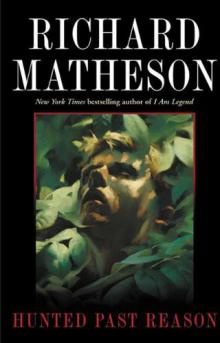 Hunted Past Reason
Hunted Past Reason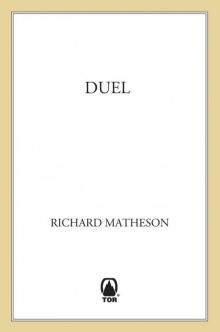 Duel: Terror Stories
Duel: Terror Stories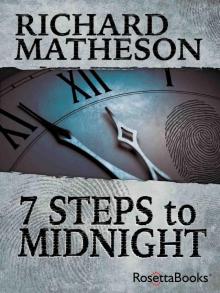 7 Steps to Midnight
7 Steps to Midnight Somewhere in Time
Somewhere in Time Ride the Nightmare
Ride the Nightmare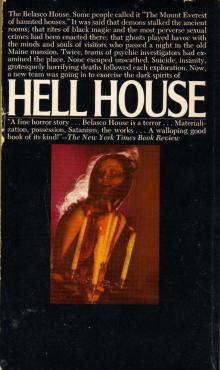 Hell House
Hell House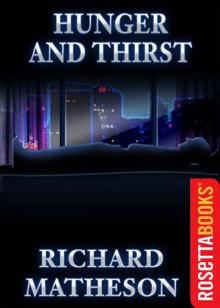 Hunger and Thirst
Hunger and Thirst Lyrics
Lyrics Other Kingdoms
Other Kingdoms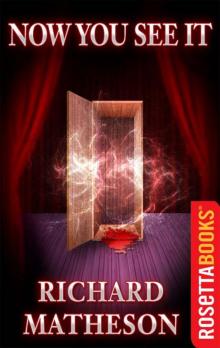 Now You See It . . .
Now You See It . . .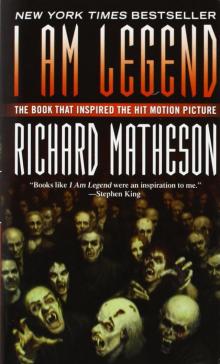 I Am Legend
I Am Legend The Box: Uncanny Stories
The Box: Uncanny Stories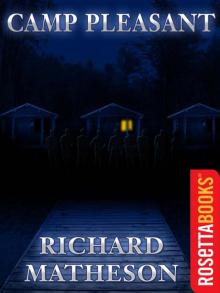 Camp Pleasant
Camp Pleasant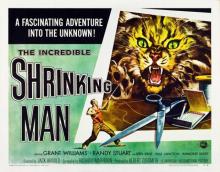 The Incredible Shrinking Man
The Incredible Shrinking Man What Dreams May Come
What Dreams May Come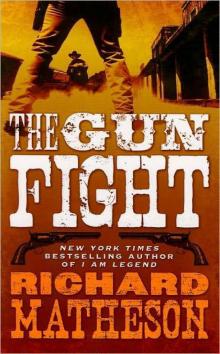 The Gun Fight
The Gun Fight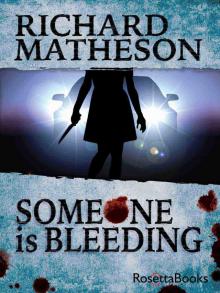 Someone Is Bleeding
Someone Is Bleeding Mediums Rare
Mediums Rare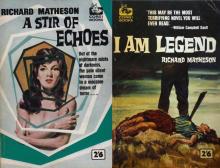 A Stir of Echoes
A Stir of Echoes Backteria and Other Improbable Tales
Backteria and Other Improbable Tales Offbeat: Uncollected Stories
Offbeat: Uncollected Stories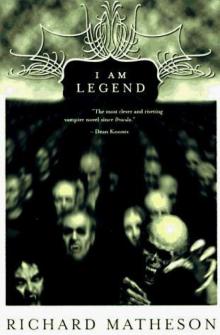 I Am Legend and Other Stories
I Am Legend and Other Stories The Best of Richard Matheson
The Best of Richard Matheson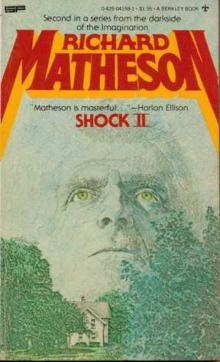 Shock II
Shock II Steel: And Other Stories
Steel: And Other Stories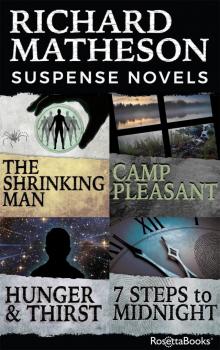 Richard Matheson Suspense Novels
Richard Matheson Suspense Novels The Link
The Link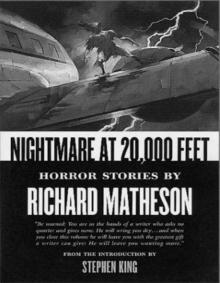 Nightmare At 20,000 Feet
Nightmare At 20,000 Feet Shadow on the Sun
Shadow on the Sun![Steel and other stories [SSC] Read online](http://i1.bookreadfree.com/i/03/21/steel_and_other_stories_ssc_preview.jpg) Steel and other stories [SSC]
Steel and other stories [SSC] Created By
Created By Offbeat
Offbeat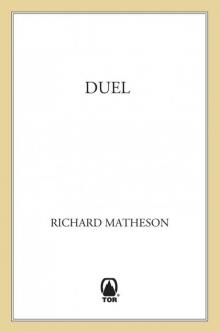 Duel
Duel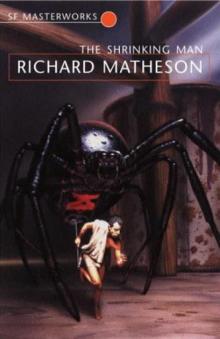 The Shrinking Man
The Shrinking Man Steel
Steel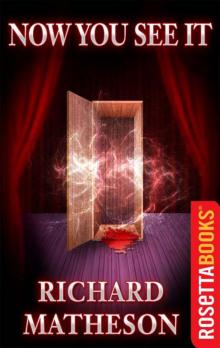 Now You See It
Now You See It